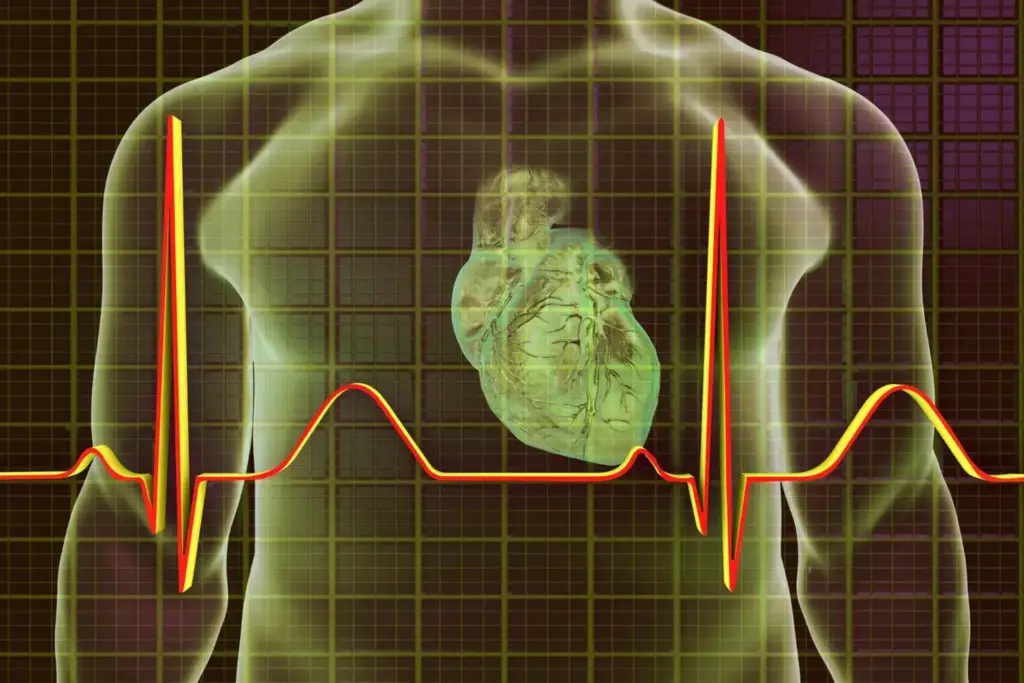
Feeling a racing heartbeat, sweating, or dizziness at night can be scary. At Liv Hospital, we know how important it is to spot atrial fibrillation signs early. We want to help you understand what these signs mean for your health.
-Dr. says knowing the cause of a problem is key to fixing it. We focus on reliable care to help you deal with atrial fibrillation’s challenges.
Spotting these signs is a big step towards better health. We’ll show you the main signs to look out for. We’ll also explain what they mean for your overall health.
Key Takeaways
- Atrial fibrillation can show up at night, causing discomfort and health worries.
- Understanding the symptoms is key for effective treatment and management.
- Liv Hospital is dedicated to patient-centered care.
- Spotting the signs can lead to better health outcomes.
- Our team of experts is here to help you with your health concerns.
Understanding Atrial Fibrillation: What Happens to Your Heart
It’s important to understand atrial fibrillation to manage its symptoms. These symptoms often get worse at night, making it hard to sleep. Atrial fibrillation, or AFib, is a heart condition that makes the heart beat irregularly and fast.
The Mechanics of AFib
AFib happens when the heart’s upper chambers, or atria, don’t beat right. This irregular beating can cause symptoms like heart palpitations and shortness of breath. It also raises the risk of stroke and heart failure.
The heart’s electrical system gets disrupted in AFib. Normally, the heart beats in a steady rhythm. But in AFib, the electrical signals get mixed up, causing the atria to quiver.
Why Symptoms Often Intensify During the Night
AFib symptoms often get worse at night. This is because of the body’s natural rhythm and how it affects the heart. Also, lying down can change blood pressure and heart pressure, making symptoms worse.
When we sleep, our body relaxes, and symptoms might be less noticeable during the day. Stress and anxiety, which can trigger AFib, can build up throughout the day and worsen at night.
The Impact of Sleep Position on AFib Episodes
The way you sleep can affect AFib episodes. Sleeping on the right side can put pressure on the heart, making symptoms worse. Sleeping with your head and upper body elevated can help reduce heart pressure.
People with AFib should pay attention to their sleep position. Trying different positions and using supportive pillows can help manage symptoms at night.
AFib Symptoms at Night: The 9 Key Signs to Watch For
It’s important to know the signs of AFib at night to get help quickly. Atrial fibrillation, or AFib, can show up differently at night. It’s key to know the signs and what they mean.
How Nighttime Symptoms Differ from Daytime Symptoms
AFib symptoms change a lot from day to night. This is because of how our body position and heart rate change. At night, symptoms like palpitations and shortness of breath can be worse. They can mess up our sleep and how we feel overall.
The Prevalence of Nocturnal AFib Episodes
Nocturnal AFib episodes happen more often than people think. Research shows that AFib symptoms get worse because of our body’s natural rhythms and sleep patterns. Knowing how common these episodes are can help manage AFib better.
Why Recognizing These Signs Matters for Your Health
Spotting AFib symptoms at night is key for getting medical help fast. By recognizing these signs, people can get the right treatment. This can lower the risk of serious problems like stroke and heart failure.
The 9 key signs of AFib at night include:
- Rapid or irregular heartbeat
- Palpitations or a feeling of skipped beats
- Shortness of breath or difficulty breathing
- Chest discomfort or pain
- Dizziness or lightheadedness
- Fainting or near-fainting spells
- Fatigue or weakness
- Sweating or flushing
- Anxiety or panic
By knowing these signs and getting medical help when needed, people can manage their AFib better. This can improve their quality of life.
Rapid or Irregular Heartbeat: The Primary Warning Sign
Atrial fibrillation often shows up as irregular heart rhythms. These can be scary, even when you’re resting or sleeping. It’s important to know how these rhythms differ from normal heartbeats to spot AFib episodes.
How to Identify Abnormal Heart Rhythms While Resting
Spotting abnormal heart rhythms means paying attention to unusual chest feelings. A normal heart rate is usually between 60 to 100 beats per minute. If your heart rate is way off or irregular while resting, it might be AFib. It’s good to know your body’s usual rhythms and notice any changes.
Distinguishing Between Normal Fluctuations and AFib Patterns
Telling normal heart rate changes from AFib patterns can be tough without medical training. A big difference is that AFib usually means your heart beats in a completely random way. Normal changes might happen due to stress, caffeine, or other short-term reasons. Always talk to a doctor for a correct diagnosis.
Using Technology to Monitor Nighttime Heart Rate
New tech like smartwatches and health apps make tracking heart rate at night easier. Using a smartwatch or fitness tracker can give you insights into your heart’s nighttime activity. Some devices can even spot irregular rhythms and warn you about AFib.
By keeping an eye on your heart rhythms, you can spot AFib warning signs. This way, you can get help if you need it.
Heart Palpitations and Chest Discomfort During Sleep
For those with AFib, heart palpitations and chest pain at night are more than just annoying. They can signal a serious issue that needs medical help. Atrial fibrillation, or AFib, is a heart condition that causes an irregular and often fast heart rate. This can lead to symptoms like heart palpitations and chest pain.
What AFib Palpitations Feel Like at Night
AFib palpitations at night can feel like a pounding or fluttering in your heart. These feelings can be scary and might wake you up. -Dr. says, “The irregular heartbeat of AFib is more noticeable at night. This can make it hard for some to sleep.”
How AFib palpitations feel can vary. Some people might feel a skipped beat, while others might feel their heart racing. Knowing these feelings is key to managing AFib well.
Types of Chest Sensations Associated with AFib
Chest sensations from AFib can range from mild to severe. These feelings can be sharp, dull, or a feeling of pressure. Below is a table showing the different chest sensations people with AFib might feel.
| Type of Sensation | Description |
|---|---|
| Sharp Pain | A sudden, intense pain that may be stabbing or piercing. |
| Dull Ache | A persistent, mild discomfort that is often felt as a heaviness or pressure. |
| Pressure | A feeling of being squeezed or constricted in the chest area. |
Differentiating AFib-Related Chest Pain from Other Conditions
It’s important to tell AFib-related chest pain from other heart issues. The treatment for each can be different. AFib-related chest pain is often linked to an irregular heartbeat and may come with other symptoms like palpitations or shortness of breath.
Key differences between AFib-related chest pain and other cardiac concerns:
- AFib-related chest pain is often irregular and may be associated with an irregular heartbeat.
- Other heart problems, like angina or myocardial infarction, usually have more consistent pain patterns.
Knowing these differences is key for the right diagnosis and treatment. If you’re feeling chest discomfort or palpitations, seeing a healthcare professional is a must to find out why.
Breathing Difficulties: Shortness of Breath While Lying Down
Many people with atrial fibrillation (AFib) struggle with breathing when lying down. This can be scary and mess up their sleep.
Why Breathing Problems Worsen in the Horizontal Position
Lying down changes how blood moves in our body. This can make breathing harder for those with AFib. Gravity pulls fluid towards the lungs, making it tough to breathe.
The Connection Between Sleep Apnea and AFib
Sleep apnea is linked to AFib. It causes pauses in breathing during sleep. These pauses can put a lot of strain on the heart, leading to AFib episodes.
Positional Strategies to Improve Nighttime Breathing
Changing how you sleep can help with breathing. Try sleeping on your side with a pillow between your knees. Or use a wedge pillow to help your lungs expand better.
Dizziness, Lightheadedness, and Vertigo with Nighttime AFib
Feeling dizzy or lightheaded at night can be really scary, and it’s even worse when it’s because of AFib. AFib not only affects the heart but also how we feel, making nighttime episodes even harder.
Why AFib Affects Your Balance and Perception
AFib can mess with blood flow, which might cut down on oxygen to the brain. This can make you feel dizzy or lightheaded. When you’re lying down, these feelings can get even stronger because of how blood moves in your body.
The Link Between AFib and Vertigo Episodes
Vertigo, or feeling like you’re spinning, can happen with AFib. The irregular heartbeat can change blood pressure, which might mess with your inner ear’s balance. Knowing this link is key to handling vertigo caused by AFib.
Safety Concerns When Experiencing Nighttime Dizziness
Nighttime dizziness or vertigo can make you more likely to fall when getting up. It’s important to be careful, like using a nightlight or making sure the way to the bathroom is clear. If you often or severely feel dizzy, you should talk to your doctor to change your treatment.
By understanding why dizziness and vertigo happen with AFib, people can take steps to lessen these symptoms. This can help improve their life quality a lot.
Sweating and Anxiety: The Body’s Response to AFib Episodes
Atrial fibrillation (AFib) episodes can make you sweat and feel anxious, which is hard at night.
AFib makes the heart beat irregularly, causing stress hormones like adrenaline to rise. This leads to a faster heart rate, higher blood pressure, and breathing. It’s a protective response but can cause uncomfortable symptoms in AFib.
The Science Behind Night Sweats During AFib
Night sweats during AFib are due to the body’s stress response. The heart’s irregular rhythm triggers this response, causing blood vessels to widen and sweat. This can mess up sleep and lower quality of life.
The exact reasons for night sweats in AFib are complex. They involve many body processes. But managing these symptoms is key to improving comfort and outcomes.
How Anxiety Both Triggers and Results from AFib
Anxiety and AFib affect each other. Anxiety can start AFib episodes, and AFib can make anxiety worse. This creates a cycle where both conditions get worse.
It’s important to understand this relationship to manage symptoms effectively. By using relaxation techniques, changing lifestyle, and possibly therapy, we can reduce AFib episodes.
Breaking the Cycle of Anxiety and Heart Rhythm Disturbances
To break the cycle of anxiety and AFib, we need a full approach. This includes stress management like meditation and deep breathing. It also involves medical treatments for AFib symptoms.
With a holistic treatment plan, people can manage AFib better, reduce anxiety, and live better lives. This approach helps with symptoms now and improves health in the long run.
Headaches, Nausea, and Post-Episode Fatigue
Atrial fibrillation (AFib) can cause headaches, nausea, and feeling very tired after an episode. It’s important to understand these symptoms to manage AFib well.
Understanding AFib-Related Headaches
Headaches from AFib happen because of irregular heartbeats. This can lead to less blood flow or more stress. Using stress-reducing techniques can help lessen headache problems.
Why Nausea Occurs During Heart Rhythm Abnormalities
Nausea with AFib comes from the body’s reaction to irregular heartbeats. This might reduce blood flow. Drinking plenty of water is key to fighting nausea.
Managing the Exhaustion That Follows AFib Episodes
Feeling very tired after an AFib episode is common. Resting and using relaxation methods can help. Activities like yoga or reading can be helpful.
Silent AFib: When Your Heart Is in AFib But You Don’t Feel Symptoms
Silent AFib is a tricky condition where your heart beats irregularly but you don’t feel any symptoms. This makes it hard for people to know they have a problem. It can also delay getting the right treatment.
Risk Factors for Asymptomatic AFib
There are certain factors that make you more likely to have Silent AFib. Knowing these can help spot who might be at risk.
- Age: As you get older, the chance of getting AFib, including the silent kind, goes up.
- Underlying Health Conditions: Having conditions like high blood pressure, diabetes, or heart disease can lead to AFib.
- Family History: If your family has a history of AFib, you’re more likely to get it too.
Detection Methods for “Silent” Episodes
Finding Silent AFib can be tough because there are no obvious symptoms. But, there are ways to spot it.
- Regular Check-Ups: Going for regular health checks can catch AFib with an electrocardiogram (ECG).
- Monitoring Devices: Devices and apps that track your heart rhythm might find AFib.
- Screening Programs: Some places have programs to screen people at high risk of AFib.
The Importance of Regular Monitoring for At-Risk Individuals
It’s key for people at risk of AFib to get regular check-ups. Knowing the risks and using detection tools can help manage Silent AFib. This can lead to better health outcomes for those affected.
Conclusion: Managing AFib for Better Sleep and Overall Health
Managing AFib well means taking a full approach. This includes spotting nighttime symptoms early and acting fast. Knowing the signs like irregular heartbeats and breathing issues helps a lot.
Working with doctors is key to making a plan that fits you. This might mean new treatments or changes in how you live. These steps can boost your health big time.
Hospitals use a team effort to fight AFib. They use the latest tech and care that’s just for you. This way, you can sleep better and feel better overall.
Handling AFib right is important for your health. Being active in your care can lower risks and make life better. Taking care of AFib at night is a big part of this. It helps you sleep well and stay healthy.
Does atrial fibrillation cause nausea?
Yes, atrial fibrillation can cause nausea. This is because the irregular heartbeat and reduced cardiac output. These can lead to less blood flow to the stomach and other organs.
Can atrial fibrillation cause headaches?
Yes, atrial fibrillation can cause headaches. This is due to the irregular heartbeat and possible reduction in cardiac output. These can cause less blood flow to the brain.
Does AFib cause sweating?
Yes, AFib can cause sweating, mainly during episodes. This is because of the body’s stress response and increased sympathetic nervous system activity.
Can you have AFib and not know it?
Yes, it’s possible to have atrial fibrillation without noticeable symptoms. This is called “silent AFib.”
Can atrial fibrillation cause dizziness?
Yes, atrial fibrillation can cause dizziness or lightheadedness. This is due to the irregular heartbeat and possible reduction in cardiac output.
How do you feel after an AFib episode?
After an AFib episode, you might feel exhausted, weak, or short of breath. This is because of the prolonged irregular heartbeat and possible reduction in cardiac output.
Can AFib cause vertigo?
Yes, AFib can contribute to vertigo episodes. This is more common in individuals with underlying vestibular or balance disorders.
Can AFib cause chest pain?
While AFib itself may not directly cause chest pain, it can lead to discomfort or palpitations. These may be felt as chest pain.
How can I manage AFib symptoms at night?
To manage AFib symptoms at night, try lifestyle changes. Keep a consistent sleep schedule and avoid triggers. Use relaxation techniques. Also, follow prescribed treatments and medications.
Can AFib be detected during sleep?
Yes, AFib can be detected during sleep. This is done using devices like Holter monitors or wearable heart rate monitors.
What is the connection between sleep apnea and AFib?
Sleep apnea and AFib are closely linked. Sleep apnea can increase the risk of developing AFib. This is because of repeated episodes of low oxygen levels and inflammation.
How can I improve my sleep with AFib?
To improve sleep with AFib, manage AFib symptoms and maintain a healthy lifestyle. Use relaxation techniques to reduce stress and promote better sleep quality.











